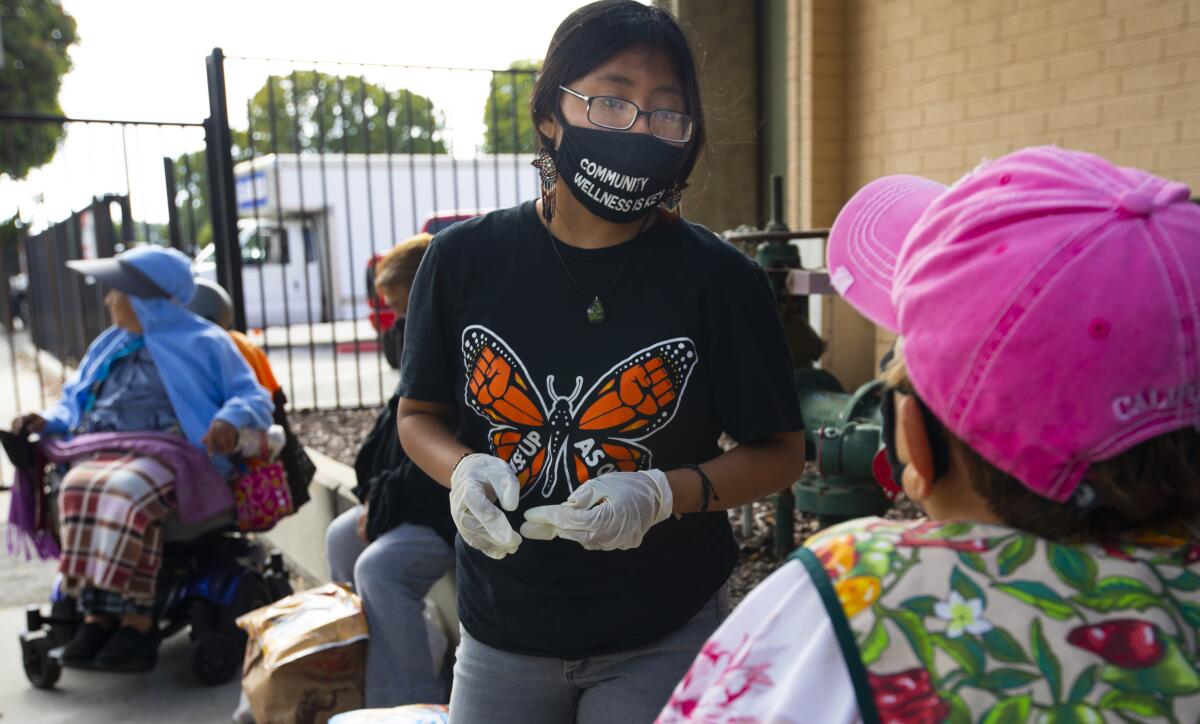‘I’m tired of hiding’: After judge orders feds to take new DACA applications, some Californians rejoice

- Share via
Leidy León was writing an academic paper for a class at UC Merced about the historical oppression of people of color when she learned Friday that a federal judge had ruled that the Trump administration must accept new applications for the Deferred Action for Childhood Arrivals program.
She burst into tears and called her mother, who began crying as well.
“Ya era tiempo,” her mom told her. “It was about time.”
León, 18, left Mexico with her family as a toddler and has no clear pathway to U.S. citizenship. But now she is applying for the first time to DACA, as the federal program is more widely known.
The Obama-era program allows immigrants who were brought to the U.S. as children the opportunity to live and work legally in the U.S and shields them from deportation. Those approved for the program must meet certain requirements and undergo background checks.
Many, like León, were simply too young to become eligible before the Trump administration rescinded DACA in 2017. Others didn’t apply when they could. As immigrant youths aged into eligibility, federal officials barred them from applying while lawyers litigated the issue in the courts.
After the Supreme Court struck down the Trump administration’s attempt to terminate DACA in June, a federal judge in Maryland ordered the government to restore the program to its original terms.
Instead, Chad Wolf, acting secretary of the Department of Homeland Security, issued a memorandum the following month that prohibited first-time applications, reduced work permits from two years to one, and significantly limited the ability of DACA recipients to travel outside the U.S.
DACA recipients and would-be applicants sued. U.S. District Judge Nicholas G. Garaufis in New York ruled the memo was issued without legal authority because Wolf had been unlawfully appointed acting secretary.
Garaufis said the government must post a public notice by Monday that new DACA applications are being accepted.
Supporters of DACA are not yet in the clear. Attorneys general in 10 states asked a federal judge in Texas to declare the program unlawful. A hearing in that case is scheduled for this month.
Nearly 800,000 people were approved for DACA at the height of the program in 2017. As of June, the program had 646,000 beneficiaries. An estimated total of 1.3 million people are now eligible, according to the Migration Policy Institute, including 366,000 in California.
Juliana Macedo do Nascimento, state and local policy manager of the advocacy group United We Dream, called Friday’s ruling a huge victory. Macedo do Nascimento, herself a DACA recipient who was born in Brazil and raised in Orange County, said she hopes the ruling encourages others to apply.
“This is what we’ve been fighting for,” she said. “We don’t know what the Texas case is going to bring. We don’t know what the Biden administration will be able to do. But we know that now people have the chance to apply for DACA.”
María Blanco, executive director of the UC Immigrant Legal Services Center at UC Davis, said this was the first year that no freshmen have had protections under DACA. Though Blanco is optimistic, she said the Texas case is a stalking horse given that no court has yet ruled on the legitimacy of DACA rather than the legality of the way in which it was rescinded.
“In a way, it was always a stopgap measure,” she said. “We need some kind of permanent solution. What’s frustrating for all these folks is having been now — for the last three years and going on four — sort of political pawns. This is not a game for them.”
León set to work on her DACA application right away. On Saturday, she left urgent messages for her doctor and high school districts seeking her records.
She thought about getting a job to help her mother, a caregiver at a residential facility who provides for León’s two younger brothers in Watsonville.
It would be her first job. The summer before starting 11th grade, after León picked up applications for a taqueria, doughnut shop and grocery store, her mom sat her down for “the conversation” to tell her she wasn’t eligible to work.
“I’m tired of hiding,” León said. “I’m just tired of not having any control over my life, and I’m tired of sitting around and waiting. This is an opportunity.”
Others who are now eligible to apply are more wary. Rotzely Garcia, who was three months shy of being old enough to apply for DACA before it was rescinded, said she’s holding off on getting too excited.
“Maybe after the next court hearing … I can finally say we won,” she said.
Meanwhile, the 17-year-old high school student who lives in downtown L.A. said she’s focusing on her studies. After her mother lost her job due to the COVID-19 pandemic, Garcia said, she tried looking for a part-time job to support her family but eventually gave up because she was afraid of being caught by an employer or government officials while working without authorization. Instead, she volunteered to phone bank ahead of the election.
“I wanted to make sure we didn’t have President Trump for a second term,” she said. “I did it for our community.”
Beatriz Basurto didn’t feel much like celebrating the court decision either.
“After being shot down over and over again throughout the years, there’s a point where I and others have become numb to this sort of news,” she said. “I don’t want to be a party pooper, but we have to be realistic.”
Basurto, a 19-year-old college student from Oxnard, has no memory of her home in Mexico after leaving at age 3. Three years ago, she missed her chance to apply for immigration relief under DACA.
As Basurto watched DACA open opportunities for her older siblings and peers, she saw her own prospects diminish. Even so, she found success as a contract worker with a well-paying job as a Mixtec interpreter for farmworkers in Oxnard.
“I’ve come this far without having documentation,” Basurto said she tells herself. “I have to just be mentally prepared for the worst-case scenario.”
Still, she said, having DACA would enhance her life and part of her does want it. She would be able to legally travel back and forth to Mexico. And it would be a relief to know she was spared deportation.
“That would just be the worst thing for me, to be separated and not be there for my family,” she said.
More to Read
Sign up for Essential California
The most important California stories and recommendations in your inbox every morning.
You may occasionally receive promotional content from the Los Angeles Times.











